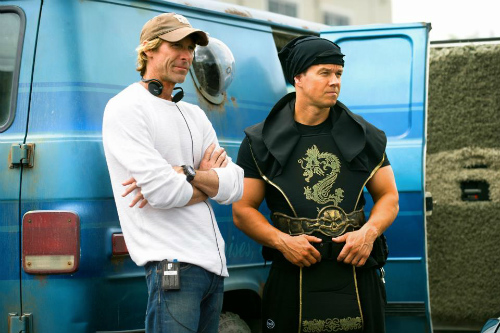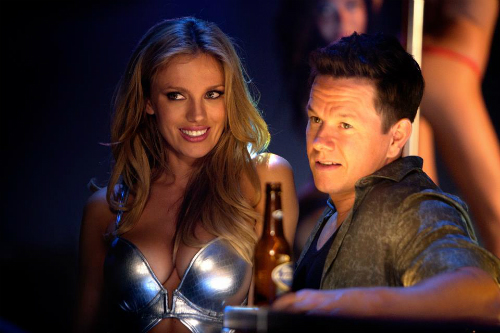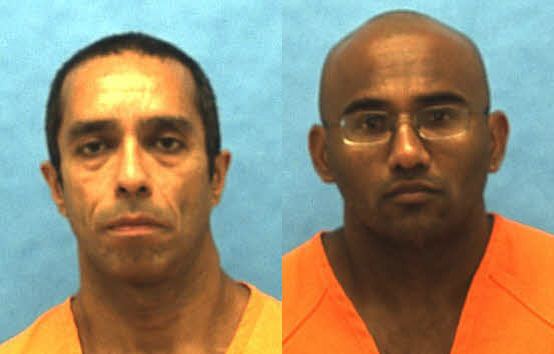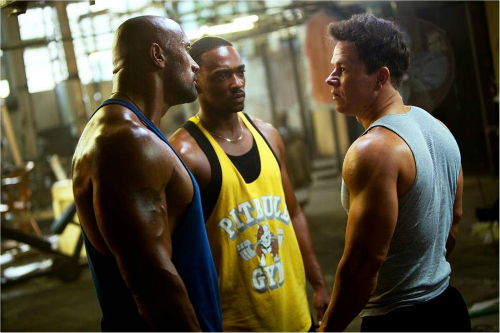Fanboy Flick Pick: Pain & Gain Is Not Michael Bay’s Redemption
 |
I never thought my primary complaint about a Michael Bay movie would be that there’s too much talking in it. I guess a man has to know his limitations – he’s not known for dialogue (or monologue)-heavy movies, so when he tries to do one, we could probably have assumed it wouldn’t be his thing. But for a director so previously fixated on images over story, the extent to which he relies on non-stop words in Pain & Gain is…disappointing? Irritating?
Let’s just say it, as so many have about Transformers – he’s not really the right director for this source material, about three ‘roid-raged, bumbling gym rats who decide to better themselves with a series of bungled crimes during the ’90s that they actually manage to get away with for a while. On paper, you can see why he might be the guy, being a filmmaker who came to fame in the ’90s with the visual equivalent of celluloid steroids – there’s even a significant shoutout to his mentors Don Simpson and Jerry Bruckheimer, with the conspicuous use of “Gangster’s Paradise” on the soundtrack, recorded for the duo’s Dangerous Minds.
I don’t doubt that Bay has had brushes with the world of cocaine and surgically enhanced hookers that Simpson was quite familiar with and that the lead trio in this film dream about and briefly attain. After seeing the movie, though, I don’t think he has the distance to understand that this film ultimately is one of his protagonists, in spirit, so desperate to attain a goal that it keeps throwing things out there in hopes that one will work, succeeds in spurts but then ultimately fails (this is, relatively speaking, a true story, so that’s not really a spoiler).
 |
Bay and comedy may not mix too well, but to give him credit where credit is due: for a guy so often accused of loving broad racial stereotypes, he’s cast pretty color-blindly this time around. Without getting encyclopedic about the real folks this is loosely based upon, let’s just say that racially and in many other ways, they didn’t greatly resemble Mark Wahlberg, Anthony Mackie and Dwayne Johnson. (Plus Ken Jeong shows up as a self-help guru without any of the “screaming Asian” tics he’s normally saddled with.) The only obvious caricature-based jokes the movie goes for are fat jokes, though in a movie about obnoxious fitness buffs that not only makes sense, but is counterbalanced somewhat by the fact that Mackie’s Adrian Doorbal has a thing for plus-sized girls.
 |
| Not Mark Wahlberg and Anthony Mackie (via Miami New Times) |
There seems to be a real need out there in the zeitgeist for this to be Bay’s One Great Movie, the thing that will allow geeks who can’t admit to liking The Rock or Bad Boys 2 to be able to say publicly that they don’t hate the guy any more. I get the impulse, but this is not the critical hill upon which to die. The Coen brothers could have (and have) done something great with the story of incompetent kidnappers/heisters, while Steven Soderbergh could also have effectively tackled the dichotomy between despicable and endearing that is needed here. Bay is not them. That’s not always a bad thing – I don’t want the Coens directing Bad Boys 3, either – but it’s not a helpful thing in this instance.
When the movie works, it does so because it is cast well. Johnson’s work here is comparable to what he did in Be Cool – he finally and wonderfully steps outside of typecasting in a film that doesn’t quite deserve it, and as a result will probably fall back into the predictable PG hero roles that bring the money. As a naive ex-con-turned-Jesus-freak, he’s the most likable of the bunch in that his stupidity makes him endearingly vulnerable rather than turning him into a loud asshole. Wahlberg, pumped up to Funky Bunch-era levels, is the slick man with the plan who’s actually full of shit, and it’s a decent stretch for him too – the early scene of him screaming in super slo-mo is destined for Internet gif stardom. Mackie, cast as more of a straight man to these two, is given a ton of dick jokes to make up for it; this is arguably a reverse racial stereotype, like somebody in the production office said, “Hey, you know how so many movies joke about how the black guy has a big penis? Well, what if we did the opposite?” Douchey high-fives may or may not have been exchanged at that point.
 |
Bay vets Peter Stormare and Ed Harris show up as well in entertaining smaller roles, and while Tony Shalhoub goes even more over-the-top than he did as a Men in Black alien, he gamely does his best to be despicable as the primary victim of the crimes. It’s what the movie calls for, though ironically it might be a misstep: while we’re supposed to feel sympathy for the real-life bad guys because their target is such a jerk, it’s very difficult to root for them to succeed when they really don’t deserve it and they mostly blow all their money on stupid stuff first chance they get. You don’t have to be an uptight moralist to see that the story’s compass is hopelessly screwed-up. Maybe Bay finds them sympathetic because he wants the same things in life they do, though if that’s the case I have to say his taste in women is getting worse – the strippers herein are about as fake and unpleasant as, well, actual high-end strippers. The beneficiary of this is Rebel Wilson as Doorbal’s nurse-turned-wife, whose big bod is a more natural beauty by comparison.
What kills things most, though, is the narration. Who’s the narrator, you may ask? Every fucking character, at one point or another. And we’re not talking Malick-style internal monologue – we’re talking each character getting a turn as omnipotent storyteller, filling us in on the stuff we’re seeing and therefore already know. Some of the best parts are de rigeur music-video style montages that would be the plot-killers in any other film; they’re welcome not just because Bay is a natural music-video director, but because it finally forces the voice-overs to shut the hell up.
Like its anti-heroes, Pain & Gain imagines itself to be Robin Hood on steroids. Instead, it’s your drunk friend who thinks he’s the life of the party and ends up passing out in the backyard after making you laugh a few times.
